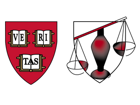Posts filed under 'Intellectual Property'
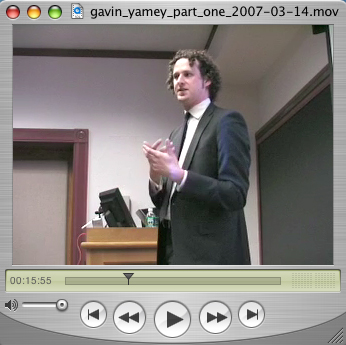
Click To Play Video
Gavin Yamey on “Opening Up to Open Access: What Can Other Disciplines Learn from the Sciences?”
What can academics do to ensure that their research results are included in the growing “knowledge commons?” Gavin Yamey MD, Senior Editor of PLoS Medicine and Consulting Editor of PLoS Neglected Tropical Diseases, shares his experiences in the open access movement and explores possible avenues for its expansion to other fields, with a focus on the social sciences and humanities.
The Public Library of Science, an international non-profit grassroots movement of scientists and physicians, is working to change the status quo by campaigning to make the biomedical literature a freely available global public good. PLoS now publishes 7 open access journals, and is urging traditional biomedical publishers to adopt more socially responsive practices. Will other fields follow in their footsteps?
This event is sponsored by the Berkman Center and Harvard College Free Culture and will take place Wednesday, March 14 at 7:30pm in Sever Hall Room 202 at Harvard University. It is a lead up event to the 2007 Internet & Society Conference, which will be held on the Harvard Campus on June 1, 2007.
Runtime: 1:17:38, size: 320×240, 158mb, QuickTime .mov, H.264 codec
March 17th, 2007
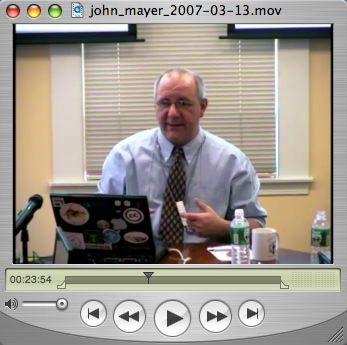
Click To Play Video
John Mayer, Executive Director of the Center for Computer-Assisted Legal Instruction (CALI), a non-profit consortium of over 200 law schools joined the Berkman Center to discuss CALI’s use of both social networking tools, as well as innovative software in the quest to provide the most thorough and practical means of legal education.
Specifically, John walks through the different types of software that CALI offers and why they have proven to be so useful to their large network of users. He also presents the idea of common casebooks, which would not only offset the cost, but allow for constant and immediate updating capabilities.
Video produced by Henok Mehari.
March 14th, 2007
 John Mayer, Executive Director of the Center for Computer-Assisted Legal Instruction (CALI), a non-profit consortium of over 200 law schools joined the Berkman Center to discuss CALI’s use of both social networking tools, as well as innovative software in the quest to provide the most thorough and practical means of legal education.
John Mayer, Executive Director of the Center for Computer-Assisted Legal Instruction (CALI), a non-profit consortium of over 200 law schools joined the Berkman Center to discuss CALI’s use of both social networking tools, as well as innovative software in the quest to provide the most thorough and practical means of legal education.
 Download the audio podcast (time: 1:02:06).
Download the audio podcast (time: 1:02:06).
Specifically, John walks through the different types of software that CALI offers and why they have proven to be so useful to their large network of users. He also presents the idea of common casebooks, which would not only offset the cost, but allow for constant and immediate updating capabilities.
March 13th, 2007
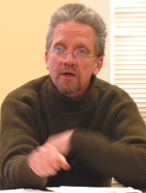 David Herlihy of Northeastern University leads a discussion on “Internet and the Music Industry” as part of the Berkman Center Luncheon Series.
David Herlihy of Northeastern University leads a discussion on “Internet and the Music Industry” as part of the Berkman Center Luncheon Series.
 Download the audio podcast (time: 1:05:57).
Download the audio podcast (time: 1:05:57).
A professor of music industry and copyright, David reviews the current landscape of the field and explores both business models and copyright policy for the future.
David maintains a law practice which concentrates in entertainment law, intellectual property, copyright, trademark, licensing, and new media. His clients include authors, publishers, record companies, recording artists, songwriters, composers, performers, producers, recording studios, visual artists, e-business innovation companies, software and service providers, webcasters, and entrepreneurs.
March 6th, 2007
 Matthew Pearl, best-selling author and Visiting Lecturer at Harvard Law School participated in the Berkman Center Luncheon Series on February 27 to discuss: “The Literary Vision of Copyright.”
Matthew Pearl, best-selling author and Visiting Lecturer at Harvard Law School participated in the Berkman Center Luncheon Series on February 27 to discuss: “The Literary Vision of Copyright.”
 Download the audio podcast (time: 1:07:28).
Download the audio podcast (time: 1:07:28).
Derived from his current course at HLS, Pearl considered how literary titans such as Twain, Dickens, Poe, and Whitman confronted copyright transitions in their time. From copyright clubs and associations that transformed the intellectual property map, to modern rhetoric about intellectual property and the large role it may continue to play separate from legal realities.
February 28th, 2007

Click To Play Video
Berkman Fellow Lewis Hyde talks about the topic of his upcoming work, “the privatizing of the cultural commons.”
Hyde addresses many of the issues and concerns that modern copyright use presents to works traditionally open for public consumption. Referencing the life and work of Ben Franklin, he argues on behalf of the public’s need for access to traditionally public ideas and works for the benefit and progression of society.
February 13th, 2007
 Berkman Fellow Lewis Hyde talks about the topic of his upcoming work, “the privatizing of the cultural commons.”
Berkman Fellow Lewis Hyde talks about the topic of his upcoming work, “the privatizing of the cultural commons.”
 Download the audio podcast (time: 1:09:25).
Download the audio podcast (time: 1:09:25).
Hyde addresses many of the issues and concerns that modern copyright use presents to works traditionally open for public consumption. Referencing the life and work of Ben Franklin, he argues on behalf of the public’s need for access to traditionally public ideas and works for the benefit and progression of society.
February 13th, 2007
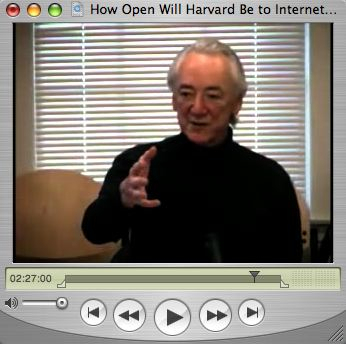
Click To Play Video
How Open Will Harvard Be to Internet & Society? That’s the big question for the Internet & Society 2K7 Conference, set for May 31 and June 1, 2007. What would a more open Harvard mean or look like for faculty, for staff, for students, for alumni? Is there an understanding among all as to what open access is? The process and the conversations in the lead up to the Spring conference are integral in the shaping of the conference; at this Tuesday’s lunch, Professor Nesson spoke about his hopes for Internet & Society at Harvard. As importantly, he solicited the spirited the needs, desires and perspectives of those affected by the policies across Harvard and beyond.Charles Nesson, with fellow Harvard Law Professor Charles Ogletree, has been chairing biannual Internet & Society conferences since 1996. He has written about his prelinimary hopes for this conference over at his blog.
Produced by Indigo Tabor and Colin Rhinesmith.
December 21st, 2006
 Professor Charles Nesson asks “How Open Will Harvard Be to Internet and Society?”
Professor Charles Nesson asks “How Open Will Harvard Be to Internet and Society?”
 Download the MP3 (time: 1:23:25).
Download the MP3 (time: 1:23:25).
How Open Will Harvard Be to Internet & Society? That’s the big question for the Internet & Society 2K7 Conference, set for May 31 and June 1, 2007. What would a more open Harvard mean or look like for faculty, for staff, for students, for alumni? Is there an understanding among all as to what open access is? The process and the conversations in the lead up to the Spring conference are integral in the shaping of the conference; at this Tuesday’s lunch, Professor Nesson spoke about his hopes for Internet & Society at Harvard. As importantly, he solicited the spirited the needs, desires and perspectives of those affected by the policies across Harvard and beyond.
Charles Nesson, with fellow Harvard Law Professor Charles Ogletree, has been chairing biannual Internet & Society conferences since 1996. He has written about his prelinimary hopes for this conference over at his blog.
Produced by Indigo Tabor and Colin Rhinesmith.
December 18th, 2006
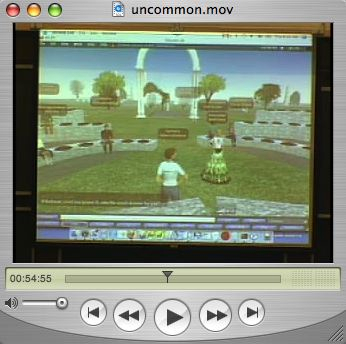
Click To Play Video
Law schools don’t just educate new lawyers; they house vibrant communities that research, develop, and share legal knowledge. How might law schools take advantage of our increasingly networked environment or use emerging network technologies to foster robust learning communities? Can such communities bridge between the academy and practice?
On the occasion of Harvard Law School’s most significant curriculum revision since the 1870s, join law professors, professional educators, practicing attorneys, and technologists to discuss the coming transformation of legal education.
To learn more about this event, including panelists, visit Berkman Fellow Gene Koo’s blog.
December 8th, 2006
Next Posts
Previous Posts


 John Mayer
John Mayer Download the audio
Download the audio  David Herlihy of Northeastern University leads a discussion on “Internet and the Music Industry” as part of the
David Herlihy of Northeastern University leads a discussion on “Internet and the Music Industry” as part of the  Matthew Pearl
Matthew Pearl
 Berkman Fellow
Berkman Fellow 
 Professor
Professor 
